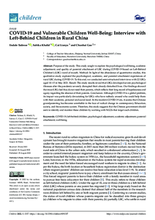Purpose of the study:
This study sought to explore the psychological well-being, academic adjustment, and quality of parental attachment of LBC during COVID-19 based on Left-Behind Children’s (LBC) word of mouth.
Method:
In light of the abundance of quantitative studies, this qualitative study explored the psychological, academic, and parental attachment experiences of rural LBC during COVID-19. To this end, we conducted semi-structured interviews with 22 LBCs aged 10–15 in May 2021.
Result:
The study results reveal that LBCs developed severe psychological illnesses after the pandemic severely disrupted their already disturbed lives. Our findings showed that most LBCs feel they do not need their parents, which reflects their long record of hopelessness and agony regarding the absence of their parents.
Conclusion:
Although COVID-19 is a global problem, its impact was particularly devastating for LBCs who have nobody around who could help them with their academic, personal and social need. In the modern COVID-19 era, it seems that Chinese grandparenting has become unreliable in the face of radical change in contemporary Education, society, and the economic system. Therefore, this study suggests that the Chinese government should seek to identify and monitor these children by working with NGOs that target such children.

